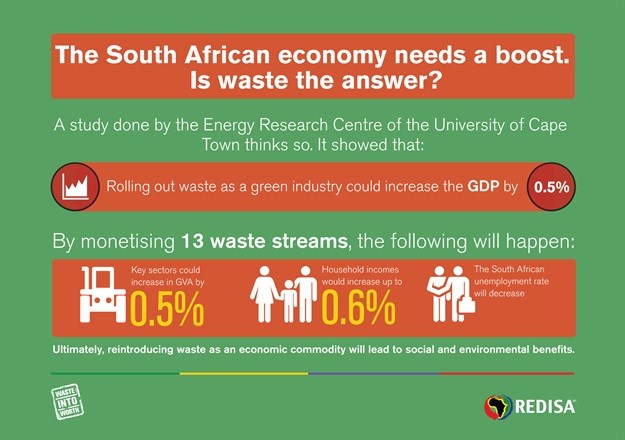
Subscribe & Follow
#AfricaMonth
In the news
How waste can stimulate South Africa's economy
The answer lies in urban mining, the process of reclaiming compounds and elements from products and buildings when they reach the end of their useful life, and become what we currently deem waste.

A new study undertaken by the Energy Research Centre of the University of Cape Town in November 2016 investigates the economic impact of the introduction of resources back into the economy through waste stream management.
Increase in GDP
Calibrated to the 2009 economy, the study shows that rolling out waste as a green industry would effect a 0.5% increase in GDP. According to the authors, this is a very conservative figure as the output multiplier effect is extraordinary and hasn’t been included in the calculations.
Commenting on the findings, co-author, economist and head of R&D at REDISA, Dr Reza Daniels says, “Our need to grow the economic pie in SA is now more important than ever before. Waste offers us the opportunity to take what is fundamentally dead capital and bring it back to life by monetising it.”
“In South Africa, this has already been done in the waste tyre industry, but the opportunities for other waste streams are much larger. This study shows the opportunities that exist and the catalyst needed to make waste a viable economic driver locally.”
Using the SA General Equilibrium (SAGE) model to estimate the economy-wide impacts, and working with a scenario of 13 monetised waste streams, other key impacts in the study include:
- The potential to increase domestic supply and lower prices of commodities through the re-introduction of recycled commodities;
- The increase in waste to electricity and plastics recycling adds the most value of the 13 waste streams, due to their sizable impacts on the supply and price of commodities;
- There is a notable decrease in the level of coal mining activity due to the decrease in coal-fired power generation however, this creates a significant upswing in gross value added (GVA) for electricity-intensive users such as non-ferrous metals, and iron and steel;
- Other key sectors such as agriculture and service experience an increase of more than 0.5% in GVA;
- Households experience an increase in income of up to 0.6% which is driven by increased returns in production factors and increased levels of employment; and
- By reintroducing waste as an economic commodity there are a number of social and environmental benefits from removing waste from landfills, including impacts on health, greenhouse gas emissions, and less soil and water contamination to name a few.
The research only scratches the surface of what is truly possible as it does not account for the catalytic impacts on the economy from increased intermediate goods and services demand, higher employment and lower waste disposal costs. However, in a second paper entitled "Economic benefits of extended producer responsibility initiatives in South Africa: The case of waste tyres" authors Hartley, Caetano and Daniels expand on the simple supply shock outlined in the first paper, using the Integrated Industry Waste Tyre Management Plan (IIWTMP) as a calibration point.
The over-arching findings based on the introduction of the IIWTMP, are that there are several positive impacts on the SA economy, namely:
- The introduction of the new industry provides employment of labour and capital through the functions outlined in the plan;
- The supply of total commodities in the economy increases due to the production of recycled products, ultimately reducing the prices and providing a positive stimulus to the economy and stimulating exports;
- The tyre recycling industry provides a new source of demand to the economy, which could lead to a positive impact on other sectors if they are able to increase their output; and
- Government spending increases as the shift toward extended producer responsibility reduces the financial burden on government as producers are now paying for the disposal of their products.
“The results from this analysis are once again likely to be underestimating the potential economic benefits given that the environmental benefits associated with recycling have not been quantified and accounted for and that the analysis is static and not dynamic.
“What is of critical importance though is that by using the IIWTMP as a case study we are able to demonstrate that extended producer responsibility initiatives that directly subsidise waste beneficiation activities and build recycling industries, do have significant potential for positive economic impacts and environmental benefits,” concludes Daniels.















